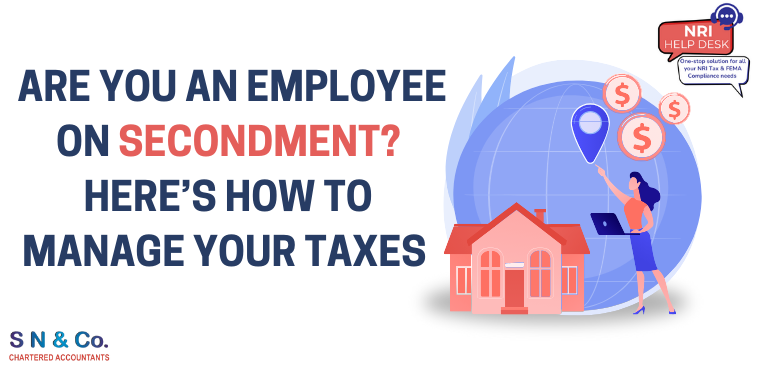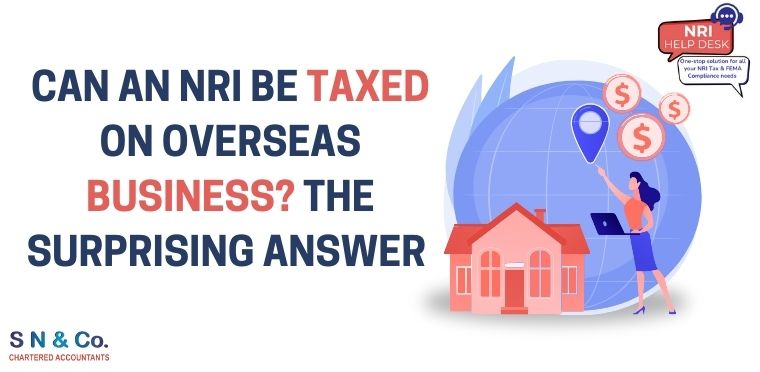International secondments offer employees global career growth, but they also introduce complex tax challenges. If you are temporarily working in another country, you may have several tax-related concerns, such as:
- Will my salary be taxed in my home country or the host country?
- How does the Double Taxation Avoidance Agreement (DTAA) help me avoid being taxed twice?
- Who is responsible for withholding Tax Deducted at Source (TDS) from my salary?
- Does my duration of stay impact my tax liability?
This guide breaks down the tax implications for seconded employees, explaining DTAA benefits and providing a real-life case study to help you navigate tax planning effectively.

Taxation of Seconded Employees: Key Rules to Know
Tax laws vary across countries, and DTAA provisions determine where your salary is taxable. The key factors to consider are:
- Residential Status and Stay Duration – If you stay in a host country beyond a certain period (usually 183 days), you may be considered a tax resident and required to pay local taxes.
- Salary Taxation Under DTAA – Some tax treaties allow salary to be taxed only in the home country if certain conditions, like the 183-day rule, are met.
- Employer’s Role in Tax Compliance – If your salary is paid or reimbursed by the host country employer, it may be subject to tax in that country.

Case Study: Understanding Secondment Taxation in India
Scenario:
- ABC LLP (UK) seconds employees to PQR Co. (India).
- The secondee is a resident of the Netherlands (NL).
- While in India, he becomes an employee of PQR Co.
- Salary Breakdown:
- PQR Co. pays 70% of his salary.
- ABC LLP pays 30% in the UK.
- The secondee spent the following days in India:
- FY 2019-20: 130 days
- FY 2020-21: 365 days
- FY 2021-22: 330 days
- FY 2022-23: 95 days
- The secondment ends in May 2022, when he returns to the Netherlands.
Key Taxation Questions:
- Is his salary taxable in India or the Netherlands?
- Can he claim a tax exemption under DTAA?
- Who is responsible for deducting TDS on his salary?

How Is the Secondee’s Salary Taxed?
Step 1: Determine Residential Status & DTAA Eligibility
- Since the secondee is a resident of the Netherlands, he must obtain a Tax Residency Certificate (TRC) to claim benefits under the India-NL DTAA.
Step 2: Taxability Under Indian Income Tax Laws
- Section 5(1) of the Income Tax Act, 1961, states that income earned in India is taxable in India.
- Since he renders services in India, his salary is considered Indian-sourced income, making it taxable in India.
Step 3: Applying DTAA (India-Netherlands Agreement – Article 15: Dependent Personal Services)
According to Article 15(2) of DTAA, the salary would be exempt from Indian tax if:
- Condition 1: The employee is in India for less than 183 days in a financial year.
- Condition 2: The salary is paid by a non-resident employer (ABC LLP, UK).
- Condition 3: The salary is not reimbursed by an Indian company (PQR Co.).
Final Verdict:
Since the secondee stayed in India for more than 183 days (FY 2020-21 & FY 2021-22), he does not qualify for the DTAA exemption and is liable to pay tax in India.
✔ His salary is taxable in India.

How Should Seconded Employees Plan Their Taxes?
To minimize tax liabilities, seconded employees should consider the following:
✔ Monitor stay duration – If possible, limit stay in the host country to less than 183 days to qualify for DTAA exemptions.
✔ Optimize salary structuring – If salary is paid and retained by the home country employer, taxation in the host country may be reduced.
✔ Claim Foreign Tax Credit (FTC) – If salary is taxed in both countries, employees can claim FTC under DTAA to reduce the tax burden.
Without proper planning, secondees may face unexpected double taxation and higher tax liabilities.

Why Employers Must Ensure Tax Compliance for Seconded Employees
Employers play a critical role in secondment tax compliance. They must:
✔ Deduct TDS on salaries paid to seconded employees in the host country.
✔ Properly structure secondment agreements to minimize tax burdens for employees.
Failure to comply with tax deduction rules can result in penalties and additional tax liabilities for the employer.
Legal Framework Governing Secondment Taxation
- Section 5(1) of the Income Tax Act, 1961 – Income earned in India is taxable in India.
- Article 15(2) of DTAA (India-NL) – Salary is taxable only in the country of employment unless the 183-day exemption applies.
- Section 192 of the Income Tax Act, 1961 – Indian employers must deduct TDS on salary paid to secondees.
These provisions clearly define tax rules, ensuring compliance for both employees and employers.

How Does This Impact Seconded Employees & Employers?
For the Seconded Employee:
- Salary becomes taxable in India if stay exceeds 183 days.
- If salary is paid by an Indian company, it is taxable in India under DTAA.
- Foreign Tax Credit (FTC) can be claimed in the home country to avoid double taxation.
For the Employer (PQR Co. in India):
- Must deduct TDS on salary paid to the secondee.
- Reimbursement of salary to ABC LLP may create tax liability in India.
- Failure to comply with tax deduction rules may lead to penalties.
For the Home Country (Netherlands):
- If India taxes salary, the employee may need to claim a tax credit in the Netherlands.
- Double taxation risk exists if proper documentation (TRC) is not maintained.

Final Thought: Plan Before Your Secondment to Avoid Tax Surprises
International work assignments can enhance career opportunities, but they require careful tax planning. Understanding secondment taxation rules before relocating helps employees and employers avoid unnecessary tax burdens.
Key Takeaways:
- Salary earned for work done in India is taxable in India.
- DTAA can prevent double taxation, but proper documentation (TRC) is required.
- Indian employers must deduct TDS on salary paid to secondees.
- Employees should track the 183-day rule to determine taxability.
- Foreign Tax Credit (FTC) can be claimed in the home country to reduce tax liability.
Need Assistance with Secondment Taxation?
📩 Connect with us today for expert guidance on secondment taxation and compliance! 📞






